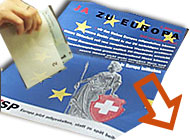No to Europe vote comes as no surprise for Swiss business

Swiss business is optimistic that voters' rejection of immediate membership talks with the European Union will not have an adverse effect on the country's economy.
The consensus among business pundits is that the “Yes to Europe” initiative, which was overwhelming rejected on Sunday, came too soon on the heels of a series of bilateral accords, approved by the Swiss last May.
“This initiative was stillborn,” said Jean-Francois Mercier at Citibank. “Odds now appear stacked against Switzerland joining the EU – and the euro – during this decade.”
Andreas Huffert, economist at UBS Warburg told swissinfo that voters “want to see how the bilaterals will work out before going a step further”.
Marcel Ospel, head of Switzerland’s biggest bank, UBS, agrees. He says the bilateral accords, approved by the Swiss people last year, should be ratified and put to the test before the two sides get any closer.
“They should now be ratified [by the EU’s member states] and then these agreements need to be implemented,” Ospel explained. “This process should not be disturbed. We have to be pragmatic.”
Business leaders believe that Swiss voters feel they have gone far enough by approving the bilateral accords and that they have little to gain and much to lose from forging even closer ties with the EU.
The Swiss economy is doing better than those of many of its European competitors, and Swiss inflation is lower than the European average. Unemployment, too, is far lower than the EU average as is income tax and VAT.
The weak euro has also helped to persuade the Swiss that there is little benefit in giving up the traditionally strong Swiss franc.
“As long as the euro is a weak currency, the attractiveness of the Swiss franc is enhanced”, both to the Swiss and foreign investors said Citibank’s Mercier.
The smooth passage of the bilateral accords, which govern mainly trade ties, has been in marked contrast to Swiss voters’ views about wider EU membership.
The reason, according to Credit Suisse senior economist Fritz Stahel, is that the bilaterals are seen as an economic issue, whereas the idea EU membership conflicts with several key aspects of Swiss political identity.
“The bilaterals are a useful step-by-step approach to economic integration. But the question of joining the EU is a political one which raises issues of protecting Switzerland’s direct democracy, neutrality and federal system, and Swiss voters aren’t ready to take this step yet.”
UBS Warburg’s Huffert said the rejection of the “Yes to Europe” initiative came as no surprise in Switzerland, or the EU for that matter.
“It was very likely this outcome – everyone in Europe knew about it. The EU is treating the vote as a referendum on the timing of Swiss membership, rather than a rejection of the EU itself.”
swissinfo

In compliance with the JTI standards
More: SWI swissinfo.ch certified by the Journalism Trust Initiative
You can find an overview of ongoing debates with our journalists here . Please join us!
If you want to start a conversation about a topic raised in this article or want to report factual errors, email us at english@swissinfo.ch.